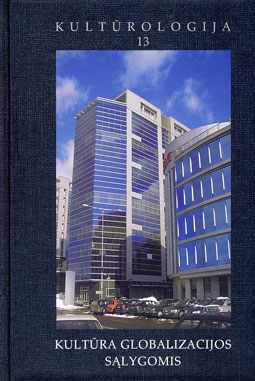Istorinė tradicija ir moderniosios istorijos iššūkiai
Historical Tradition and the Challenges of Modern History
Author(s): Vytautas BerenisSubject(s): Cultural history
Published by: Lietuvos kultūros tyrimų
Keywords: history of Lithuania; Lithuanian culture; historiography
Summary/Abstract: The foundations of national Lithuanian culture acquired their definite shape in the period of the interwar Lithuanian state between 1918 and 1940. In the course of over a hundred years having left behind the way of life of a peasant community, the Lithuanian nation laid claims to the rights of a modern nation. The rise of national states in the latter half of the nineteenth century, the triumph of nationalism and socialism, new social theories that rejected legitimate rights of the authorities and questioned their very legitimacy influenced the conscience of the Lithuanian intellectuals in one way or another and modified their attitudes towards the formation of the nation. The process of the formation of the Lithuanian selfconsciousness was significantly affected by romanticism reminding the people of the historical national experience. However, it was not only a glorification of the deeds of the dukes and the heathen past. The main components of Lithuanian national culture were ethnolinguistic values, embodied in history, folklore and in the way of life of the Lithuanian countryside. The two decades of the Lithuanian state were devoted to the creation of distinctive professional culture (theatre, art, music, literature), and a young Lithuanian intelligentsia began envisaging its ethnographic culture in the contemporary European context. This turning point in the formation of historical selfconsciousness equalled the writing of a new history, and its writers were Lithuanian intellectuals. Lithuanian national culture and ideology did not develop in natural conditions, although at the beginning of the twentieth century their forms and contents were quite clearly structured. Probably the main impediment was the relationship between Lithuanian national ideology and the ageold multicultural historical tradition of the Polish-Lithuanian estate-structured union state. The Lithuanians, like many other Eastern central European nations chose the ideological model of ethnic culture and nationalism, summaries which subsequently often turned into a political imperative in the relations with ethnic minorities and neighbouring nations. History, like the past, is inseparable from the changes of the present. It is common knowledge that political, social and ideological changes influence the strategy of historical research and even of cognition. In 1988 and 1989, in the period of reconstruction in Lithuania and of the national Sąjūdis movement the prewar ideology of national values and nationalism was revived for some time. True, historical research sustained some losses: the investigation of social economic history was neglected...
Journal: Kultūrologija
- Issue Year: 2006
- Issue No: 13
- Page Range: 10-28
- Page Count: 18
- Language: Lithuanian

